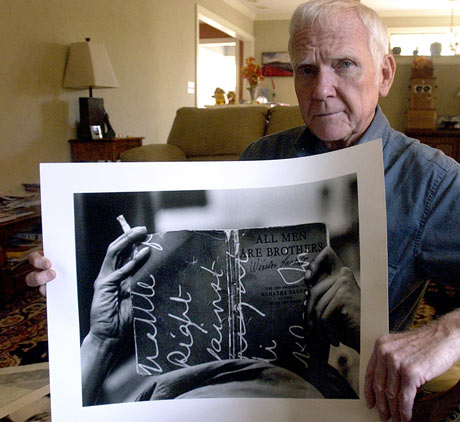From the UK Guardian:

Charles Moore with one of his photographs. Photograph: Jim Hannon/AP
US photojournalist Charles Moore, whose work chronicled the civil rights era of the 1960s, has died aged 79.
Born in Hackleburg, Alabama in the heart of the segregated South, Moore served three years in the marines and then attended the Brooks Institute of Photography in Santa Barbara, California. Returning to his home state, he found work as a photographer for the the Montgomery Advertiser and the Montgomery Journal, and was later employed on contract for Life magazine.
Moore was one of the first photographers to document the rise of Martin Luther King as a civil rights leader, and had the only camera at the scene when King was arrested for loitering in Montgomery in 1958. One of his shots (below) shows two white police officers manhandling King, whose right arm is wrenched behind his back.
 Martin Luther King is arrested in 1958. Photograph: Charles Moore/AP
Martin Luther King is arrested in 1958. Photograph: Charles Moore/AP
From the Kodak website: Some of the major events that Moore covered: the early efforts of Dr. King to desegregate Montgomery, Alabama (1958-60); the violent reaction to the enrollment of James Meredith as the first black student at the University of Mississippi (1962); the Freedom March from Tennessee to Mississippi (1963); the campaign to desegregate Birmingham, Alabama (1963); voter registration drives in Mississippi (1963-1964); Ku Klux Klan activities in North Carolina (1965); and the march from Montgomery to Selma, Alabama (1965). Click here to see more.
His photographs show a willingness to get into the heart of the action by using a short lens – whether it is protesters being attacked by police dogs or, famously, being tear-gassed by state troopers in Selma in 1965.
When published in Life – his shots of the 1963 Birmingham riots took up 11 pages – Moore’s photographs brought worldwide attention to the civil rights struggle. According to former US senator Jacob K Javits, Moore’s pictures “helped to spur passage of the Civil Rights Act of 1964”. Moore later went on to photograph the civil war in the Dominican Republic, political violence in Haiti and Venezuela, and the Vietnam conflict.
Click here to read the whole article and watch an interview with Charles

